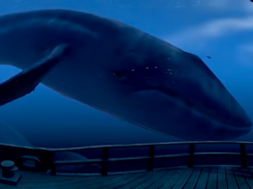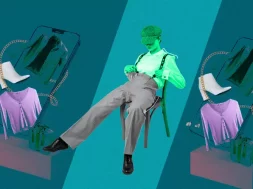
Despite the noise surrounding artificial intelligence almost completely drowning out hype around the metaverse, Ralph Lauren’s CEO is not sleeping on virtual reality opportunities—and it seems to be paying off.
The American fashion house known for its classic horse and rider silhouettes is navigating a modern landscape, where polo shirts are out but virtual avatars wearing hoodies are in.
“The media headlines have moved on, but the consumer has not,” Patrice Louvet recently told Bloomberg.
“We are investing in the metaverse. We want to be where our consumer is.
“That’s where the younger population is. That’s where they want to engage with brands like us.”
The brand debuted its first digital fashion line in Roblox Corp.’s virtual world in 2021.
For less than $5, Roblox’s 47 million daily active users at the time (it’s now at around 66.1 million) could purchase virtual puffer coats, checkered beanies, and other ski clothing from the brand’s Winter Escape collection.
In the immediate aftermath, digital customer acquisition reportedly increased by 58% cent that quarter, meanwhile shares shot up by 6%, and profits increased to $218 million, an 82% jump over the same period last year.
Its most recent ongoing partnership is with Fortnite, one of the world’s most popular video games.
Just this month, Ralph Lauren launched an immersive branded world called “Race to Greatness” on the gaming site—the Polo Pony-shaped island is the brand’s first digital landscape within Fortnite.
To coincide with the launch, players can get their hands on a real-life Polo x Fornite PWing Boot. “There are some really cool boots that we developed that you can dress your player with, but we’ve actually done a physical version of them as well,” Louvet added.
Sustainability is also on Louvet’s mind
As well as ensuring Ralph Lauren has a future in the virtual world, Louvet is also thinking about how the company can help protect the real world’s future as climate change tips over to “global boiling”.
The French-American executive told Bloomberg that he thinks about sustainability “a lot” while adding that so too are young people and investors—“particularly in Europe”.
“You can’t expect to be timeless if we’ve run out of resources,” he said. “So for me, sustainability is not a side activity, it’s not a reaction to external pressure… it’s about future-proofing our business.”
“You need the focus on sustainability to recruit,” he added. “More and more younger consumers want to work for companies that care about this planet, that do more than just generate revenue and profit.”
Recent research has shown that most students want to work in jobs that advance climate action.
Plus, according to Louvet, young consumers are also putting their money where their mouth is: “You need sustainability to attract consumers, including that younger consumer,” he doubled down. “They care deeply about what are you doing differently. Are you making a difference?”
This story was originally featured on Fortune.com












